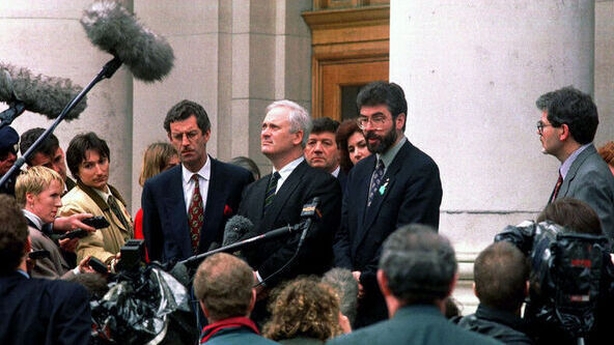By David McCullagh and Fiachra Ó Cionnaith
John Bruton did not believe that Sinn Féin and the SDLP accurately represented the views of ordinary northern nationalists and wanted to carry out opinion polling to find out what they really wanted.
Newly released State Papfskeers also show that he was wary of his own Department of Foreign Affairs, believing it shared the analysis of the two nationalist parties.
Bruton’s surprise election as taoiseach in December 1994 caused some concern in Sinn Féin, as he was not regarded as sympathetic to their cause, though Gerry Adams said in private before meeting the new taoiseach that "he was personally confident the Peace Process would continue".
Two months later, Mr Adams was less confident, complaining that the IRA ceasefire had been sold on the basis of "three pieces of the jigsaw", support from Irish America, the relationship with John Hume, and the commitment of the Fianna Fáil and Labour government.
Now the government had changed, support from Irish America had not lived up to his expectations, and Hume was the only remaining "piece of the jigsaw".
Hume too was worried, telling a senior official in the Department of Foreign Affairs that the British were using the issue of the decommissioning of IRA weapons "purely tactically to separate the taoiseach from the other protagonists of the Peace Process on the nationalist side. Hume thought it would be disastrous if we allowed this to happen".
Read more:
1994 State Papers shed little light on FF-Labour collapse
Racketeering was 'a fact of life' for paramilitaries
Issues with Rome embassy pool described as a 'debacle'
Holy Cross priest offered accommodation after threats
Five other things we learned from the State Papers
Mitchell McLaughlin of Sinn Féin agreed, expressing concern that "the government at high political level may not fully appreciate the need to keep the nationalist strategy going".
He was clearly talking about Bruton.
The taoiseach had his own concerns about Hume, suggesting to his officials in September 1995 that "we need to clarify John Hume’s personal position on the Peace Process".
He wanted to find out if Hume supported Sinn Féin’s position that there would be no decommissioning of IRA arms until the talks were over and an agreement was reached.

If he didn’t, would he support a call from the Irish government for some decommissioning during the talks as a gesture of good faith?
"As John Hume will be seen by many as the expert on the Peace Process, his interpretation and answers on these points should be known to us at the earliest possible stage. We should not be travelling blind."
In his private memos to his closest advisers, it is clear that Bruton regarded the Department of Foreign Affairs as being on the same page as Sinn Féin and the SDLP, and in need of persuasion to support his own views.
"...We need to stress to SDLP, SF, D/FA [Department of Foreign Affairs] and all others, how definite the Unionists were on paragraph ten of the Downing St declaration re 'action to show commitment’ and the vital necessity for nationalists to come up with new thinking."
He also had his doubts about what the nationalist parties were looking for – a united Ireland, or at least the creation of North-South institutions that would lead in that direction.
However, he asked whether that was really what their voters were looking for.
"Do their demands focus on sovereignty issues (as in their parties' official policy) or on ‘respect’ and ‘dignity’ issues (as I suspect is the case)?
"In the absence of a clear understanding of irreducible northern nationalist demands, there is a danger that the Irish Government will be drawn into writing a blank cheque in the talks.
"Given that they want the talks to start within two months, there is some urgency in finding out what they really want."
He suggested carrying out qualitative research into nationalist opinion in the north, to be paid for by Fine Gael.
Essentially, he wanted to find out the bottom line of Sinn Féin and SDLP supporters.
"Would they settle for a package involving powersharing, a reformed RUC, greater symbolic and cultural recognition of the nationalist community, and some modest North-South cooperation?"
The research doesn’t seem to have been carried out, but it could be argued that the kind of settlement Bruton sketched out was fairly close to what emerged in the Good Friday Agreement.
[Based on documents in 2024/28/10]

